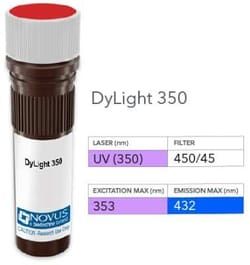CD3 epsilon Antibody (PC3/188A), PE/Cy7, Novus Biologicals™
Manufacturer: Novus Biologicals
Select a Size
| Pack Size | SKU | Availability | Price |
|---|---|---|---|
| Each of 1 | N254405PEC7-Each-of-1 | In Stock | ₹ 64,213.50 |
N254405PEC7 - Each of 1
In Stock
Quantity
1
Base Price: ₹ 64,213.50
GST (18%): ₹ 11,558.43
Total Price: ₹ 75,771.93
Antigen
CD3 epsilon
Classification
Monoclonal
Conjugate
PE-Cyanine7
Formulation
PBS with 0.05% Sodium Azide
Gene Symbols
CD3E
Immunogen
A synthetic peptide corresponding to amino acids 156-168 of the cytoplasmic domain of human CD3- chain (Uniprot: P07766 )
Quantity
0.1 mL
Primary or Secondary
Primary
Test Specificity
Recognizes the epsilon-chain of CD3, which consists of five different polypeptide chains (designated as gamma, delta, epsilon, zeta, and eta) with MW ranging from 16-28kDa. The CD3 complex is closely associated at the lymphocyte cell surface with the T cell antigen receptor (TCR). Reportedly, CD3 complex is involved in signal transduction to the T cell interior following antigen recognition. The CD3 antigen is first detectable in early thymocytes and probably represents one of the earliest signs of commitment to the T cell lineage. In cortical thymocytes, CD3 is predominantly intra-cytoplasmic. However, in medullary thymocytes, it appears on the T cell surface. CD3 antigen is a highly specific marker for T cells, and is present in majority of T cell neoplasms.
Content And Storage
Store at 4°C in the dark. Do not freeze.
Applications
Flow Cytometry
Clone
PC3/188A
Dilution
Flow Cytometry
Gene Alias
CD3e antigen, CD3e antigen, epsilon polypeptide (TiT3 complex), CD3e molecule, epsilon (CD3-TCR complex), CD3-epsilon, FLJ18683, T3E, T-cell antigen receptor complex, epsilon subunit of T3, T-cell surface antigen T3/Leu-4 epsilon chain, T-cell surface glycoprotein CD3 epsilon chain, TCRE
Host Species
Mouse
Purification Method
Protein A or G purified
Research Discipline
Adaptive Immunity, Apoptosis, Cytokine Research, Diabetes Research, Immunology, Innate Immunity, Mesenchymal Stem Cell Markers, Signal Transduction, Stem Cell Lines, Stem Cell Markers
Gene ID (Entrez)
916.0
Target Species
Human, Rat, Porcine, Bovine, Chicken, Equine, Rabbit
Isotype
IgG1
Description
- CD3 epsilon Monoclonal specifically detects CD3 epsilon in Human, Rat, Porcine, Bovine, Chicken, Equine, Guinea Pig, Rabbit samples
- It is validated for Flow Cytometry.

